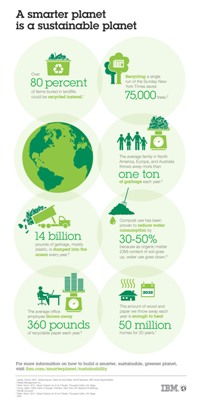IBM and Recology, a resource recovery company in San Francisco, have entered into a partnership to further bring down landfill disposal by upgrading recycling programs in order to help San Francisco attain zero waste by the year 2020.

San Francisco’ diversion rate, which represents the diversion of waste from landfill disposal, is 78%, the highest value in the United States. According to independent study results, North America’s greenest city is San Francisco thanks to its advanced recycling programs.
Recology in partnership with Key Info Systems, an IBM Business Partner, is utilizing IBM's smarter computing approach to IT to analyze data so as to classify and quantify materials in the waste stream of San Francisco. Recology utilizes IBM's Power System to identify the location, types and quantity of waste collection for composting or sorting. Recology manages around 3,000 tons of material per day in San Francisco.
This data is helpful to Recology to determine the most-efficient recycling programs for various neighborhoods and business districts. In this way, Recology assists cities to effectively manage costs related to waste collection and disposal, thus eventually helping businesses and residents.
This smarter way of recycling has helped Recology customers in San Francisco to achieve a 49.7% reduction in garbage waste sent to the landfill. The program has helped in saving 20 million trees by recycling roughly 1.2 million tons of paper. Moreover, the program has saved 19 million gallons of oil by recycling 135,000 tons of metals and has helped the city to power its cable car system for around three years by saving energy through recycling 174,000 tons of glass.
San Francisco gets 20 different recycling programs from Recology, greater than any other US city. However, the city’s residential customers pay a monthly fee less than or equivalent to the fee being paid by residents in other main cities.
Recology’s Curbside Compost Collection Program in San Francisco has produced nutrient-rich compost by converting 1.1 million tons of plants and foods diverted from landfill disposal. A carbon emission reduction of over 347,500 metric tons has been achieved by the compost collection program since its launch.